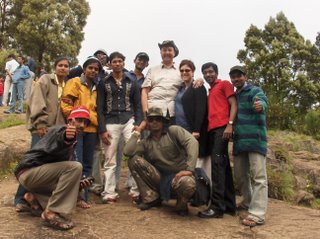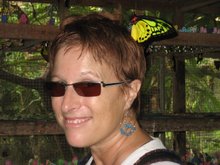Thursday, November 30, 2006
November 30, Varkala, Kerala, India
Oh Mandee...
For the uninitiated: the bathing method of choice of most of South and Southeast Asia is the mandee (pronounced mon-deeee). The mandee consists of a big bucket, a large scoop, a faucet, and sometimes a stool. Sometimes there is a shower head as well, which may or may not work. Hot water will come for a specific few hours in the morning, or may be promised and not come, or isn't promised at all. Most hotel bathrooms have a western toilet; some also include the ever popular squat toilet. So the bathroom usually consists of some toilet(s), some bathing method(s), a sink, and a drain; the bathing area is the same as the rest of the room with no curtain.
While I find a cool shower refreshing in the afternoon, I'm still all about the warm water pulsing down one's neck and shoulders thing. Eric, he loves the mandee. Which might explain the condition sometimes of our bathroom back home. I complain that a duck has been bathing in our sink. Eric just quacks.
Friday, November 24, 2006
Pics
Thursday, November 23, 2006
11/25/2006 Varkala, Kerala, India
We arrived in Varkala at 8 a.m., and walked about three kilometers up the hill from town to the strip of backpacker hotels along a bluff overlooking the Arabian Sea. The temperature was about 90 degrees Fahrenheit and humid, especially steamy as we were carrying 40-pound backpacks. Our hotel is Clafouti House and we passed its restaurant along the way, along with hawkers for hotels and shop stalls, but Eric thought the sign was only directional and that we needed to go further. At a certain point along the bluff we dropped our packs and he scouted along the strip while I sat on a concrete fence overlooking the sea. About 10 feet away from me a Tibetan man with a short, thin goatee squatted on the fence, perched like a bird, facing Kunga Tibetan shop. He was the only shop owner not hawking his wares; he only jumped off the fence when someone went into his shop, then came back to his perch. Eric returned without finding the hotel; I insisted it was back the other direction and volunteered to go look. First I asked the Tibetan man but he didn't know where it was; another shop owner overheard and confirmed it was back the way we had come. So I went off, confirmed the location, and came back. We started putting on our backpacks; Eric usually helps me up with mine but before he could, the Tibetan man said, "here, let me help you," and helped me on with the pack.
We've been enjoying the clean sea air, the cool ocean, long walks, and generally just chilling out. The town is a typical Indian town with some tourists; this bluff is dedicated to backpacker-type travelers, with thatch-roofed restaurants with ocean views and pillow seating.
 Our favorite restaurant is called The Funky Art Cafe, where the yellow dogs have just as much right as anyone to the underside of your table and the steps down to the pillowed chill space; where the music is always upbeat trance, the food is good, they make ice (to begin with) and the ice is made of bottled water. And they have a liquor license. Some of the restaurants here don't, but if asked they will surreptitiously hand you an index-card-sized drink menu and some time after you order, bring you a glass with a shot of warm gin, a bottle of warm tonic water, and some limes. So Funky Art Cafe is our restaurant of choice. Kerala Coffee (with tree house seating) is a favorite too.
Our favorite restaurant is called The Funky Art Cafe, where the yellow dogs have just as much right as anyone to the underside of your table and the steps down to the pillowed chill space; where the music is always upbeat trance, the food is good, they make ice (to begin with) and the ice is made of bottled water. And they have a liquor license. Some of the restaurants here don't, but if asked they will surreptitiously hand you an index-card-sized drink menu and some time after you order, bring you a glass with a shot of warm gin, a bottle of warm tonic water, and some limes. So Funky Art Cafe is our restaurant of choice. Kerala Coffee (with tree house seating) is a favorite too.So far I've had an ayurvedic massage complete with panchakarma and one yoga class. The massage was all about long strokes and lots of herbed? spiced? oil. Panchakarma involved warm oil streaming on my forehead for about 45 minutes; very relaxing. All that concluded with having the woman massage therapist soap me up and bathe me, with a lot of vigor and splashing. And I'm planning to take at least one more yoga class while we are here. The days have been super relaxing and surprisingly short.
There are no beggars here, but you can't get from one place to another without the hawkers practically pleading with you, asking you to promise to come back if you don't go into their shop. I've had a few things I've wanted to buy so got to know a couple of the shop owners. One is a small Indian woman named Sara, who used to be one of the girls selling sarongs on the beach. She hasn't been to school and is self-taught in English. Business hasn't been good and she is stressed because she (along with a lot of others) is paying on a business loan and the creditors can get pretty nasty. From her I bought a bag, sewn by her father (who was busy sewing bags as I shopped). I also went back to see the Tibetan guy. His name is Kunga (hence the shop name). He and his brothers came from Tibet in the early nineties. He too is self-taught and struggles a bit in English; in school in Tibet they were taught Tibetan and Chinese. He says that he would like to take his shop back to Tibet, especially now that his home town has lots of tourists. He doesn't hawk and when I told him how I hate to haggle prices, he immediately dropped the prices on what I bought since he marks it up for the usual hagglers. Interestingly, he is the one shop owner I talked to who said that business was good. From him I bought a silver bracelet with the Om Mane Padme Hum mantra inscribed in Tibetan script and a Tibetan protection symbol pendant.
I just finished reading a great book called The Bookseller of Kabul by Asne Seierstad. Seems like it was made into a movie some time back. The author lived with an Afghan family for a month and then wrote the story as narrative; everything in it is true. The book does a good job paralleling the power shifts and struggles of the bookseller's Afghan/Muslim family with post Taliban-era Afghanistan government and warlords. Meanwhile Eric read Holy Cow by Sarah Macdonald, a love/hate story about one young woman's experiences with India and its multifaceted culture. Both books are compelling and had us up reading hours after we could have fallen asleep.
Another lovely surprise ~ As often happens when we travel, we met again in Varkala a couple we had met at our guest house in Ooty. They have just finished teaching English in Japan for two years, are vacationing in India, then heading home to Sydney, Australia. We are enjoying hanging out and swapping stories, and have exchanged info in case we are ever in each other's hometowns. (Hi Joel and Jess!)
Our travel plans have changed almost daily. For a while we were thinking of going up to McLeod Ganj for December, to be there for Losar (Tibetan New Year) and to hear the Dalai Lama speak. However, both the book Holy Cow and talking to Kunga have put us off of that. It turns out that some time ago there was an attempted attack on the Dalai Lama at such a gathering; so most travelers who come to hear him speak get shunted to another area to hear his talks over a tinny loudspeaker. Additionally, Eric had been having an increasingly bad feeling about going north of Mumbai; he had a knot in his stomach over it. In his words, it felt like we would be "going up that road" (in Ooty) ~ nothing wrong with the place itself but that it could be bad for us personally. Eric being sensitive to different energies and the last person to ever get wiggy about traveling, I wondered if perhaps we were drawing some energy to us that we would experience whether we went north or not, so I suggested we just plan on leaving from Mumbai to Bangkok, and see how that felt for him. A few hours later, he reported that the bad feeling, along with the knot in his stomach, had disappeared. So our plan now is to head for Alleppey in a few days and rent a houseboat to tour the Kerala backwaters for a couple of days, then head north to Goa, Ajanta, Elora, then Mumbai to Bangkok.
Saturday, November 18, 2006
11/19/2006 Coimbatore, Tamil Nadu, India
Where in the world do people get the idea they can whack little girls around?
About a year ago, in a used bookshop, I found a copy of Bhagavad-Gita As It Is, Bhagavad-Gita being one of the utmost spiritual guides in India. I added it to my tower of books to read. As I prepared for this trip, this seemed the most timely time to read it, so I added the 800+ page, hard-back tome to my backpack. This version was writtent/annotated by A.C. Bhaktivedanta Swami Prabhupada, (a Vedic scholar and head of the Krshna Consciousness society and movement.) The author criticizes other versions of Bhagavad-Gita, mostly for un-deifying Lord Krshna as the literal Supreme Personality of Godhead, to which all living entities (that would be us) must be servant. The book is written with the literal translation of each verse followed by the author's interpretation and comment. What made me put the book down was the following ~
"Text 40
Translation
When irreligion is prominent in the family, O Krsna, the women of the family become polluted, and from the degradation of woman-hood, O descendant of Vrsni, comes unwanted progeny.
Purport (author's annotation)
Good population in human society is the basic principle for peace, prosperity and spiritual progress in life. The varnasrama religion's principles were so designed that the good population would prevail in society for the general spiritual progress of state and community. Such population depends on the chastity and faithfulness of its womanhood. As children are very prone to be misled, women are similarly very prone to degradation. Therefore, both children and women require protection by the elder members of the family. By being engaged in various religious practices, women will not be misled into adultery. According to Canakya Pandita, women are generally not very intelligent and therefore not trustworthy. So the different family traditions of religious activities should always engage them, and thus their chastity and devotion will give birth to a good population eligible for participating in the varnasrama system. On the failure of such varnasrama-dharma, naturally the women become free to act and mix with men, and thus adultery is indulged in at the risk of unwanted population. Irresponsible men also provoke adultery in society, and thus unwanted children flood the human race at the risk of war and pestilence."
Maybe this explains why the waiter at our hotel restaurant keeps giving Eric a menu and not me ~ to save me from myself, obviously. (The first time I went and got one myself; the second I asked the waiter to bring me one too. Maybe it would have built some confidence (or horror) for me to tell him about the meals I've treated people to, personally and professionally.) And maybe this explains why the form I filled out for my phone SIM card asked for my father's/husband's name. (I left that field blank.)
Why does it seem fundamentalist everybodies have to demonize, marginalize, and control women? What are they afraid of?
In recent years, under the Bush administration, I've often been out and out embarrassed to say that I am an American. One place I show my patriotism, though, is my gratitude and pride for the intelligent, fearless women and strong, evolved men who have worked to create respect and equal rights for individuals, regardless of sex, ethnicity, or sexual orientation. And I'm grateful that we have enough free press that the works of people such as Alice Walker and Zora Neale Hurston are available to teach and inspire others. There is still more to do and existing rights have to be vigilantly protected, but I am glad we have come this far.
Anyway, I am tossing this version of Bhagavad-Gita, and will find another.
 Our last day in Ooty, Eric and I spent the morning at the tea plantation/factory and the afternoon walking around the lushness of Lake Ooty.
Our last day in Ooty, Eric and I spent the morning at the tea plantation/factory and the afternoon walking around the lushness of Lake Ooty.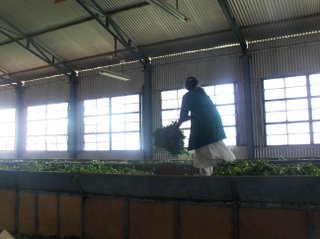
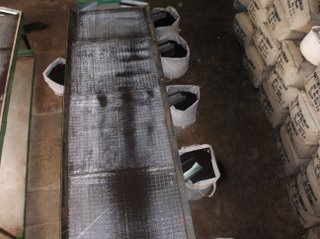
Along the same road is an attraction we thought about going to but we ran out of time: the Thread Garden. Turns out this guy spent 12 years making a huge garden containing many species of flowers, all out of thread. Get that man to Burning Man!
Heading for Coimbatore via the Ooty train station reminded me that I wanted to write about queues in India. At the first train station of our trip, we stood in line for a very long time. (The lines take a long time in general and this time the computer network was down.) We were both wearing our big backpacks and at one point, as I turned to talk to Eric, I felt something behind me. I turned around and there were two young women standing close behind us. I asked if I had hit one and she said yes, but it was okay. I stepped out of line and stood a few feet away. Now Eric's bag was dangerously close to the woman, but she didn't back up. And when Eric stepped forward, she did too, with her nose about six inches away from his pack. I couldn't figure it out. More experience in lines revealed this woman's reasoning: if you let more than a foot get between you and the person in front of you, someone will surely cut in between you, and no one says anything about it. At the front of a lot of lines, people gather and try to cut in before the next person in line gets to the counter. At the maharaja's palace in Mysore, you had to check your camera + pay five rupees for the pleasure, at a station away from the ticket office. The "queue" was about 20 people thronging the window, stepping in front of each other, elbowing in, whatever worked, with their cameras and rupees thrust into the window. It looked more like they were placing bets than simply checking in a camera. And the only way to get in to do what you need to do is to step in and do the same. Leaving Ooty, we waited on the platform, along with a bunch of other folks, for the bus to Coimbatore. The bus pulled up, and this previously sociable group of folks stormed the bus, to where there was only some crowded standing room left. I wasn't going to stand in that crush with my backpack for the four hours to Coimbatore, so we left the station and took a taxi.
We are here in Coimbatore as a break on our way to the coast, and we are spending the day doing errands and writing. We are leaving tonight at midnight for Trivandum, then on to Varkala on the Kerala coast, where we plan to stay for maybe a week.
Thursday, November 16, 2006
11/16/2006 Ooty, Tamil Nadu, India
The streets are full of folks relentlessly vying for your attention and wallet. In
And beware the bright, dapper young man who wants to help you with anything.
As we walked up the block to the maharajah’s palace in
At the top of Chamundi Hill in
As we made our way down the 1000 steps to the valley, sadhus at their shrines also demanded money. One pulled me over, "blessed" me with a thumbprint of red powder on my forehead, then held out his plate.
[Mom, close your eyes here. You too, Mel.]
After walking up and down the main drag one night in Ooty, searching for The Sidewalk Cafe, Eric pulled out our trusty Lonely Planet India book, and yet another incarnation of the dapper Dodger popped over, chatted amiably for a bit, then was excited to help us find our restaurant. He pointed out that the landmark we thought we had found,
[Okay you can open your eyes now.]
Part of what keeps us from becoming jaded is that for each Artful (and Not So Artful) Dodger, we also encounter young men who really do help strangers, people who want a picture with you, students and teachers who want to practice their English with you, and schoolgirls who shyly smile, say hello, ask your name and tell you theirs, and shake your hand. To close our hearts and refuse all but the sanitized version of tourism would make us two more ugly Americans, besides being the antithesis of why we are here, which is to experience a lot and participate in our hosting countries. So we try to learn whatever we are supposed to learn from each episode, and enjoy the story as we go on.
The bus ride from
Inside a fenced churchyard, a robed priest and a man in plain clothes sat together on the steps in front of the church, the priest’s right hand pressed against the man’s forehead, perhaps in ablution of the man’s sins, perhaps in blessing.
Rows and rows of shops ran along the road, with all kinds of wares, including bins of grains, chilies, fruits, and vegetables, herbal remedies, pharmaceuticals, clothing, and fresh fruit drinks, and people (mostly men) doing business and socializing.
Cows are given free reign on the road; all honking stops and people and vehicles move around them. We also saw pigs, dogs, goats, and monkeys along the way.
The verdant countryside was refreshing after so much city life, and included rice and cane fields along with more tropical foliage and eucalyptus trees. The ride continued up into the hills and through a national park and animal refuge, then through sporadic towns and up the hill into Ooty.
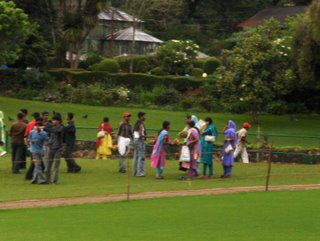 Yesterday we walked to the
Yesterday we walked to the
Then a bunch of middle-school-age boys and girls came by, and we took pictures with both our cameras with the boys. The girls shyly shook our hands, exchanged names, and giggled.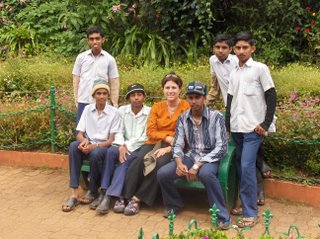
We plan to stay in Ooty another day, to visit the tea plantation. Then we are heading south into Kerala~ we’re still working on the details on that.
Saturday, November 11, 2006
11/13/06 Mysore, Karnataka, India
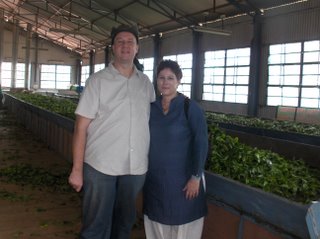
Our home is now rented to my grown kids, who are keeping up the love with our three cats, and at midnight on 11/7 we took off for Bangalore, India.
From the Mandate *This* department ~
The week we left the US, the Democrats took over both the House of Representatives and the Senate, Secretary of State Donald Rumsfeld resigned/was sacked, and India renamed "Bangalore" "Bengaluru." We have yet to actually see signs that say Bengaluru, but I'm sure they will happen at some point; our taxi driver was very happy and proud about the change. Way to take it back! in the US and India.
In recent years, Eric and I have joked about putting maple leaves on our backpacks; standing in front of us on our flight from Singapore to India was one couple who did just that. Brand spanking new ones square on the back pockets; the guy also had a red bag with maple leaves around his neck. I had seen him earlier on the 14-hour flight to Singapore, leaning against a wall in the walkway with an unlit cigarette hanging out of his mouth, looking about ready to crawl out of his skin. To me he seemed more like Sawyer from the TV show Lost, only a little older and more grizzled, with even more attitude than the few Canadians I know, certainly not like the stereotype Michael Moore talks about. In any event, I don't think they were fooling anyone and in line Eric saw they had American passports. Kind of funny, kind of sad; hopefully changes in our government will in time curtail the need for such.
During our 7-hour stopover in Singapore, we tramped through pouring rain through their colorful Chinatown and into Maxwell Food Court, a covered bevy of 100+ food stalls, and quenched Eric’s jonesing for chicken rice. On the way back to the airport we stopped for a few minutes to watch Chinese opera.
In Bangalore/Bengaluru, we stayed at the Jayamahal Palace Hotel, a colonial mansion across the street from the palace. http://www.jayamahalpalacehotel.com
Upon arrival at the reception desk, we were brought glasses of mango nectar, and the gracious manager visited with us as we sat for a spell and enjoyed what tasted like the nectar of the gods after about 28 hours of travel.
At breakfast, we had our first cuppa chai in India, which I dedicated to Serafine, who just loves a good cuppa chai. My lunch dessert of galub jamoon, filled with cheese and pistachios and flambed with brandy, I dedicated to Steve K., who loves galub jamoon.
We took a taxi to FabIndia sari boutique, where I bought a salwar (roomy pants) and four kurtas (long tunic-type shirts in cotton or silk) in gorgeous colors and prints,
well-made, for 25 US dollars. This clothing is lovely and comfortable, just like wearing jammies. I think the women here are so beautiful in their saris; even the teenage girls in the mall seem elegant and assured.
We then walked over to The Forum mall, in search of sandals and local SIM cards for our phones. Note to selves, which we've heard before: everything takes longer in India. As we are foreigners, Airtel wouldn't sell us SIM card until we went to the police station and came back with a letter of permission from the police commissioner. At another store, to get Spice SIM cards, we had to provide our passports and separate photos. So we had to go to the Kodak store and get our pictures taken, wait 45 minutes for them to develop, and go back to get the cards. Eric's quote of the day: "So like we came, like, to India, and like we went to the mall and sat in this booth and like got our pictures taken and stuff?"
The same type of challenges were true buying bus tickets to Mysore and in getting an appointment for a travel agent to book a train for Darjeeling. It's all been good practice in equanimity. It’s also a lot easier knowing you’ve got all the time in the world.
The street in India is as we've heard it would be ~ noisy, polluted, full of a fireworks display of color, and exuding exuberance and pathos.
Any marked lanes are filled with three or more vehicles abreast (cars, taxis, auto rickshaws, motorcycles, bikes, not to mention cows, dogs, donkeys, horse-drawn carriages, and vegetable carts), all honking away, driving within feet or inches of each other, weaving in and out, daring oncoming traffic, and honking constantly. Even in cases of narrow misses, though, there may be shouting but no one seems angry. The rules are real and unspoken. As a passenger, I've pretty much passed on controlling the situation, so sitting back and enjoying the flow of the ride is fun, kind of like bumper cars.
Begging is more evident here in Mysore than it was in Bangalore/Bengaluru: grannies, children, mothers holding babes, all walking alongside you, some trying to hold your arm. Eric had one mother and baby step in front of him again and again as he kept stepping to the side, in a sad dance. It felt heartrending stepping out of the street and into a shop to fill our bellies with talis, but that's how it goes here.
Our talis were served on banana leaves: banana leaf first, then rice, then ghee on the rice, then dal (lentils), korma, and another dish alongside the rice, then little pots of raita, yogurt, and other dipping sauces are placed on the side. Using your right hand, you form a rice ball, then dip it in one of the sauces and pop it into your mouth. Afterwards we were served a small tray that looked like a Zen garden, full of candied fennel and toothpicks.
Most of the people here have been very kind and gracious. At the sari boutique, the security guard who checked my daypack then gave it back to me came running over when I placed it on the ground to fill it with the package of clothing I had just bought. He picked the bag up off the ground and held it open while I inserted the clothing, then zipped it up and handed it back to me. At lunch, in search of the washroom, I walked into a dining room lined with mirrors and couldn’t figure out which mirrored door was the way to the washroom. I opened one to find the kitchen, another to find a broom closet. I felt like Alice in Wonderland. Then across the room, a frosted glass door opened, and the doorman and maitre’d, smiling and gentle, shooed me in and directed me to the washroom. Later that day, as we were trying to direct our taxi driver to us, we had problems understanding him on the phone and a man sitting next to us kindly took the phone and directed the taxi driver.
